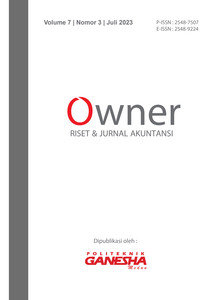Rahman, Muhammad Fatur and Supri, Zikra and Riyanti, Riyanti (2023) Analisis Kepatuhan Wajib Pajak Orang Pribadi Berdasarkan Gender, Penerapan E-System Perpajakan dan Pengetahuan Perpajakan. Analisis Kepatuhan Wajib Pajak Orang Pribadi Berdasarkan Gender, Penerapan E-System Perpajakan dan Pengetahuan Perpajakan, 7 (3). pp. 2740-2749. ISSN e –ISSN : 2548-9224 | p–ISSN : 2548-7507
![[img]](http://repository.umpalopo.ac.id/4532/1.hassmallThumbnailVersion/Sampul_191130066.jpg)
|
Image (Sampul Artikel)
Sampul_191130066.jpg - Cover Image Download (374kB) | Preview |
|
|
Text (Artikel)
Analisis Kepatuhan Wajib Pajak Orang Pribadi Berdasarkan Gender, Penerapan E-System Perpajakan dan Pengetahuan Perpajakan.pdf - Published Version Download (509kB) |
||
|
Text (Lembar Turnitin)
Turnitin_Analisis Kepatuhan Wajib Pajak Orang Pribadi Berdasarkan Gender, Penerapan E-System Perpajakan dan Pengetahuan Perpajakan.pdf - Supplemental Material Download (625kB) |
||
|
Other (Link Artikel/Riset/jurnal)
1497 - Additional Metadata Download (1kB) |
Abstract
The purpose of this study is to analyze taxpayer compliance based on gender, analyze taxpayer compliance based on the implementation of the taxation e-system and analyze taxpayer compliance based on tax knowledge. This research uses quantitative research methods, where this research leads to the possibility of a causal relationship between two or more variables. The population in this study were all individual taxpayers registered at KPP Pratama Palopo. While the sampling technique in this study was convenience sampling. The sample used was 30 respondents who came from individual taxpayers at KPP Pratama Palopo. The results of this study indicate that simultaneously gender, application of the taxation e-system and knowledge of taxation affect taxpayer compliance. Partially, the gender variable has no effect on taxpayer compliance. This is because the taxpayer will always obey his obligations as a citizen and obey the law regardless of factors that indicate he is a man or a woman. Furthermore, the variable implementation of electronic systems has an effect on taxpayer compliance. When compared to before implementing the e-system, the implementation of the e-system is more efficient, reporting can be done quickly, anytime and anywhere that is clearly connected to the internet, and data accuracy is more guaranteed. Taxpayer awareness variable affects taxpayer compliance. This means that tax knowledge possessed by taxpayers is the most basic thing that must be owned by taxpayers because without knowledge of taxes, it is difficult for taxpayers to carry out their tax obligations.
| Item Type: | Article | |||||||||
|---|---|---|---|---|---|---|---|---|---|---|
| Contributors: |
|
|||||||||
| Uncontrolled Keywords: | Gender, Taxation E-System, Tax Knowledge, Taxpayer Compliance | |||||||||
| Subjects: | L Education > L Education (General) | |||||||||
| Divisions: | Fakultas Ekonomi dan Bisnis > Akuntansi | |||||||||
| Depositing User: | Muhammad Fatur Rahman | |||||||||
| Date Deposited: | 12 Oct 2023 01:42 | |||||||||
| Last Modified: | 12 Oct 2023 01:42 | |||||||||
| URI: | http://repository.umpalopo.ac.id/id/eprint/4532 |
Actions (login required)
 |
View Item |


